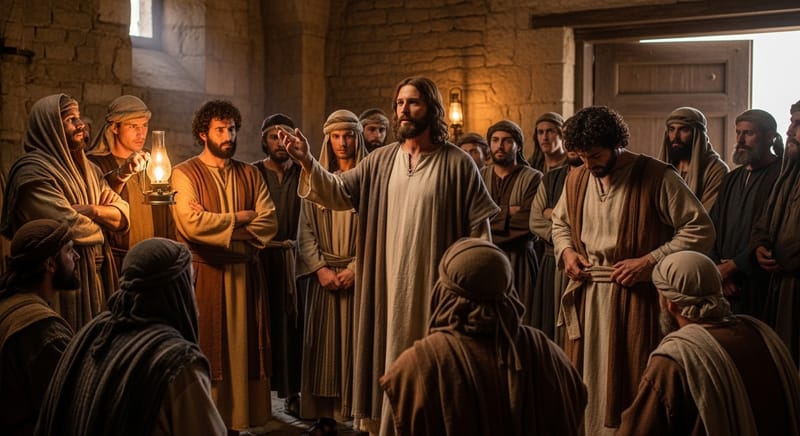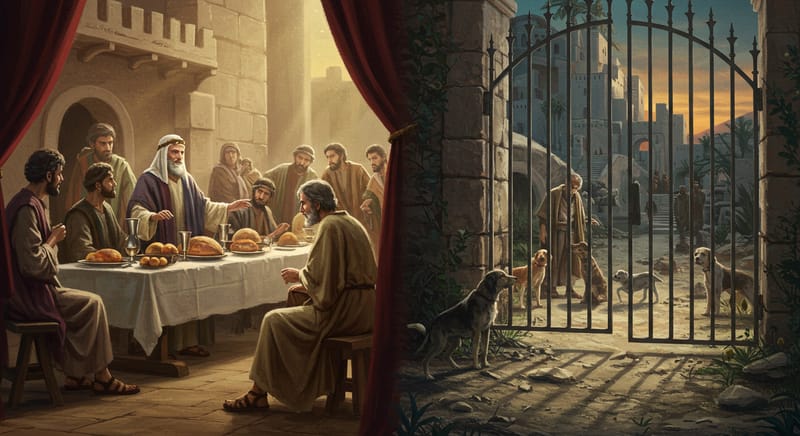DAILY HOMILIES #sin
In today’s Gospel passage, John the Baptist introduces Jesus Christ as the “Lamb of God who takes away the sins of the world!” We can interpret this statement in two ways. One, by dying for us, Jesus has become our advocate (our defence attorney), and his blood continues to plead for mercy on our behalf. We should not be afraid to approach him, regardless of our past sinfulness. Two, as the Lamb of God, there is no sin in Jesus. The closer we draw to the lamb, the less sinful we become. If you want to be rich, you must surround yourself with rich people. If you want to be holy, ensure your inner circle of friends values righteousness.
Read MoreFrom Jesus’ response, we can see that sin by itself is just as deadly and dangerous as having a whole tower fall on top of a person, or having one’s blood mixed with sacrifices. While many felt this calamity was due to the sins of the victims, Jesus said they were not even worse sinners than others. This means that God does not punish us according to our sins, but then every sin we commit is a serious matter.
Read MoreSin is not just an offence against God; it is an offence against myself. As long as I do not live by God’s instructions, I can never become all that God desires for me. When a doctor tells you to choose between your favourite meal and death, I bet you will start hating that meal. To live above sin, we must hate sin. If our hatred for sin is not intense, we may abstain for a while only to return.
Read MoreAn adage says, “When oil touches one finger, it spreads to the others.” In other words, the evil of one person is capable of destroying others. In the same way, the good deed of one person is capable of saving the world. This is what St. Paul explains in today’s reading: “Just as by the one man’s disobedience the many were made sinners, so by the one man’s obedience, many will be made righteous.” (Romans 5:19).
Read MoreThe sin of the rich man in today’s Gospel passage is not in how he made his money but in his indifference to the poor and suffering. The rich man had enough money to host parties daily and feast sumptuously, but he couldn’t help Lazarus. Lazarus was attracted to his gate in the hope of feeding on the crumbs that fell from the rich man’s table, but sadly, no one gave him anything. One great man once said, “Evil triumphs in the world not because there are bad people but because the good people don’t care.” Indifference is a sin.
Read MoreA society where there is no rule of law (where the law only applies to the poor) is doomed to fail. In the same way, anyone who has no respect for God’s laws can never succeed. How can one enjoy a product while contravening the manufacturer’s instructions? In today’s First Reading, St. Paul says to the Colossians, “Lead a life worthy of the Lord, fully pleasing to Him, bearing fruit in every good work and increasing in the knowledge of God.” We cannot continue in sin and expect miracles.
Read MoreThe simple truth is that even though many of us are frequent at Holy Communion, we have no real connection with God. At the gate of heaven, God will deny knowing us because we refused to take our hands off evil. We tried eating our cake and having it; we thought we could serve two masters. We pretended to be good externally, but we soaked ourselves in sin in secret. On the last day, it is those things we did secretly that will count.
Read MoreLike Jeremiah, we shall surely face persecution, but everything we suffer is a form of fire that purifies us from impurities just as gold is purified by fire. Our real enemy is not people but sin. As St. Paul would say: “For we are not contending against flesh and blood, but against the principalities, against the powers, against the world rulers of this present darkness, against the spiritual hosts of wickedness in the heavenly places.” (Ephesians 6:12).
Read MorePrayer is not one-way traffic. We ask God because we are His children, and by asking Him, we also declare that we live according to His instructions. Sin destroys our relationship with God. When we pray, we should have complete confidence in God. At the same time, our prayer must affect the kind of life we live. If we beg from God, we must not forget that others are begging from us; others who need our charity; others who need our forgiveness; and others who need us to intercede for them, just as Abraham did for Sodom and Gomorrah.
Read MoreJoseph was just a child when he suffered betrayal from his brothers. The worst acts of man’s inhumanity to man today are evils meted out against children. Think of the millions of children whose lives are destroyed through abortion, child abuse, sexual assault, neglect, forced labour, and even prostitution. Be good to children. Help these little ones; help them achieve their dreams.
Read MoreWhen we fear God, we can rest securely knowing that He is the protector of those who place their hope in Him. We need not be afraid of danger when we know that God is with us in the same boat. In today’s Gospel passage, Jesus was highly disappointed with the disciples because they panicked during a storm. “Why are you afraid, you of little faith?” (Matthew 8:26). Whenever you begin to panic or expect the worst outcome in any situation you may find yourself, it is a reminder that you are gradually losing faith in God. To believe in God is to know that your life is in His hands and His plans for you are for your welfare.
Read MoreToday’s Solemnity also challenges us to be the best version of ourselves as we strive to follow Christ’s footsteps on earth. Peter and Paul have long since passed away, but their legacies continue to shine. If they had approached their calling with the same lackadaisical attitude displayed by many Christians today, we would not be celebrating them today. Our time on earth is relatively short, but our impact can last for eternity. Live in a manner that the world would feel obliged to celebrate you long after you have gone.
Read More










